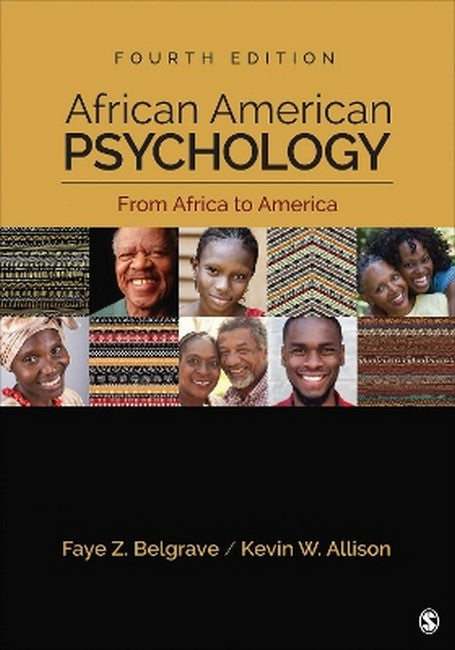Faye Z. Belgrave is Professor of Psychology at Virginia Commonwealth University and the Founding Director of the Center for Cultural Experiences in Prevention. Her programmatic and research interests are in the areas of health disparities, including drug and HIV prevention among African Americans and other ethnic minorities. Dr. Belgrave's research also focuses on the role of culture and context in prevention interventions, on women's health, and gender related issues. Much of her work has been conducted in collaboration with community-based organizations. Dr. Belgrave is an invited speaker on the topics of African American culture, and community based evaluation and research. She has received numerous awards and recognition for her research, teaching, and service including a Lifetime Achievement award from the American Psychological Association and a Distinguished Psychologists Award from the Association of Black Psychologists. Kevin W. Allison is Senior Assistant to the President of Virginia Commonwealth University and a Professor in the Department of Psychology and the Wilder School of Government and Public Affairs. He completed his undergraduate degree in psychology at the University of Notre Dame and his graduate work in clinical-community psychology at DePaul University in Chicago. Prior to joining the VCU faculty, Dr. Allison worked at Pennsylvania State University and served as the Clincal Director of City Lights in Washington, DC. Dr. Allison's work has focused on understanding and addressing processes that support positive developmental outcomes for African American children and youth. This has included the examination of life skills and culturally informed interventions for youth and work with community-based human services providers.
Request Academic Copy
Please copy the ISBN for submitting review copy form
Description
Preface Acknowledgments About the Authors SECTION I. INTRODUCTION AND HISTORICAL FOUNDATION Chapter 1. Introduction to African American Psychology Introduction, Definitions, and Conceptual Frameworks Historical Perspective on the Psychological Study of African Americans Study of African Americans in American Psychology Self-Determination Status of African American Psychology Today Methodological and Research Issues Critical Analysis Summary Chapter 2. African-Centered Psychology Introduction to African-Centered Psychology and the Africentric Worldview African American Psychologists and African-Centered Psychology African Philosophy African-Centered Research With African Americans Methodological and Research Issues Empirically Based Programs in Africentric Psychology Critical Analysis Summary Chapter 3. Self-Attributes and Identity Introductions, Definitions, and Conceptual Framework Self-Concept Among African Americans Identity: Development and Change Models of Racial Identity Sexual Identity Acculturation, Racial Socialization, Gender Roles, and Masculinity Methodological and Research Issues Best Practices for Increasing Positive Racial and Ethnic Identity and Racial Socialization Critical Analysis Summary Chapter 4. Race and Racism Introduction, Definitions, and Historical Overview Types of Racism Consequences of Racism Coping With Racism Methodological and Research Issues Evidenced-Based and Promising Practices for Reducing Racism Critical Analysis Summary SECTION II. SOCIAL SYSTEMS AND STRUCTURES Chapter 5. Kinship and Family Definitions and Historical Background on African American Families African American Family Structure What Does the African American Family Look Like? Strengths, Coping, and Parenting Patterns Methodological and Research Issues Evidenced-Based Practices for Strengthening African American Families Critical Analysis Summary Chapter 6. Education and Work Introduction and Overview Research on the Educational Experiences of African Americans Culture and Noncognitive Factors in Education Perspectives on Work, Career, Vocations, and Employment Methodological and Research Issues Evidence-Based Practices for Improving Educational Outcomes Critical Analysis Summary Chapter 7. Neighborhoods and Communities Introduction and Overview Demographic and Historical Perspectives on the African American Community Theoretical Perspectives on Communities Research on African American Communities Methodological and Research Issues Empirically Supported Practices and Policy for Community and Neighborhood Improvement Critical Analysis Summary SECTION III. INDIVIDUAL AND DEVELOPMENTAL PROCESSES Chapter 8. Interpersonal and Close Relationships Introduction, Definitions, and Historical Perspectives Friendships and Peer Relationships Romantic Relationships Interpersonal Attraction Interracial Attitudes, Friendships, and Relationships Lesbian, Gay, Bisexual, Transgender, and Queer (LGBTQ) Relationships Methodological and Research Issues Best Practices for Improving Relationships Critical Analysis Summary Chapter 9. Cognition, Learning, and Language Introduction, Definitions, and Historical Framework Cognitive Styles Learning Styles Language Methodological and Research Issues Promising Practices for Increasing Cognitive and Language Skills Critical Analysis Summary Chapter 10. Religion and Spirituality Introduction, Definitions, and Background Historical Influences Contemporary African American Churches The Black MegaChurch Spirituality, Religion, and Well-Being Contemporary Topics Methodological and Research Issues Empirically Based Practices Using Religion and Spirituality Critical Analysis Summary Chapter 11. Life Span Development Introduction and Definitions Demographics Theoretical Perspectives on the Development of African Americans Research on the Development of African Americans Methodological and Research Issues Best Practices and Promising Interventions for Improving Developmental Outcomes Critical Analysis Summary SECTION IV. ADJUSTMENT AND ADAPTATION Chapter 12. Health, Illness, and Disability Introduction, Definitions, and Background Health Promotion, Disease Prevention, and Health Care Utilization Models of Health and Illness Behaviors Cultural Models of Health and Illness Selected Health and Illness Conditions Among African Americans Methodological and Research Issues Empirically Supported Practices for Reducing Morbidity and Mortality Critical Analysis Summary Chapter 13. Psychosocial Adaptation and Mental Health Introduction and Definitions Theoretical Perspectives on Psychological Adaptation and Dysfunction Among African Americans Data on Mental Health of African Americans Research on the Role of Culture, Identity, and Discrimination in Well-Being Methodological and Research Issues Promising and Evidence-Based Practices for Improving Mental Health Outcomes Critical Analysis Summary Chapter 14. Drug Use and Abuse Introductions, Definitions, and Historical Perspectives Current Drug Use Among African Americans Diversity in Substance Use and Abuse Among Blacks Causes and Consequences of Drug Use Methodological and Research Issues Best Practices for Preventing and Treating Drug Use Critical Analysis Summary Chapter 15. Prosocial and Antisocial Behavior Introduction Prosocial Behavior Antisocial Behavior Methodological and Research Issues Best Practices for Increasing Prosocial Behavior and Decreasing Antisocial Behavior Critical Analysis Summary References Author Index Subject Index

